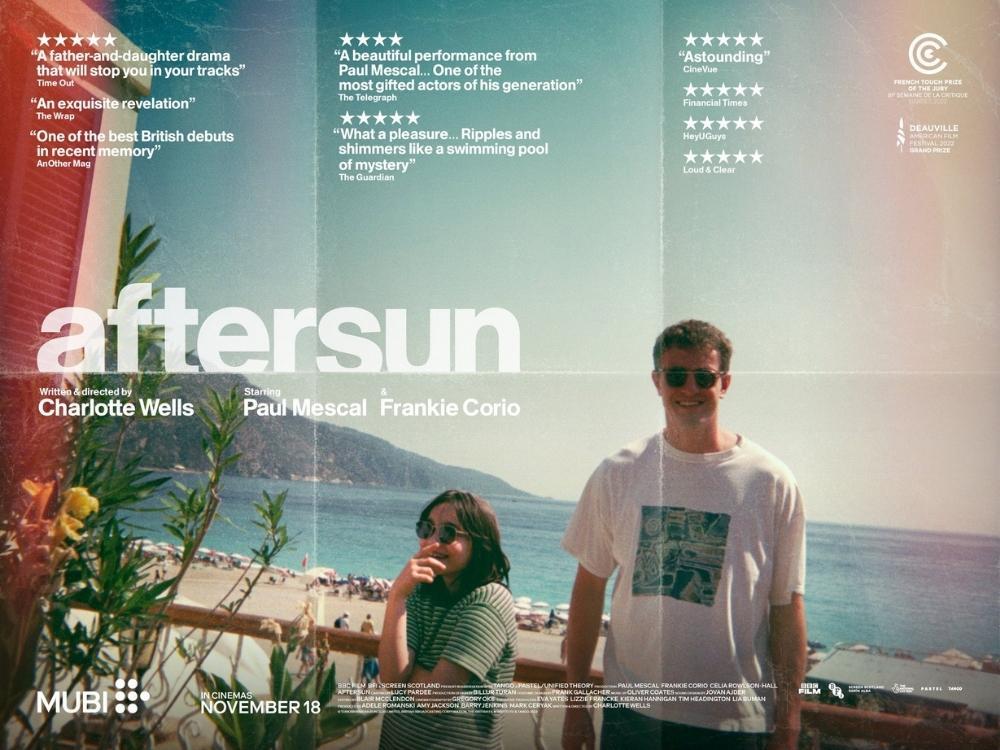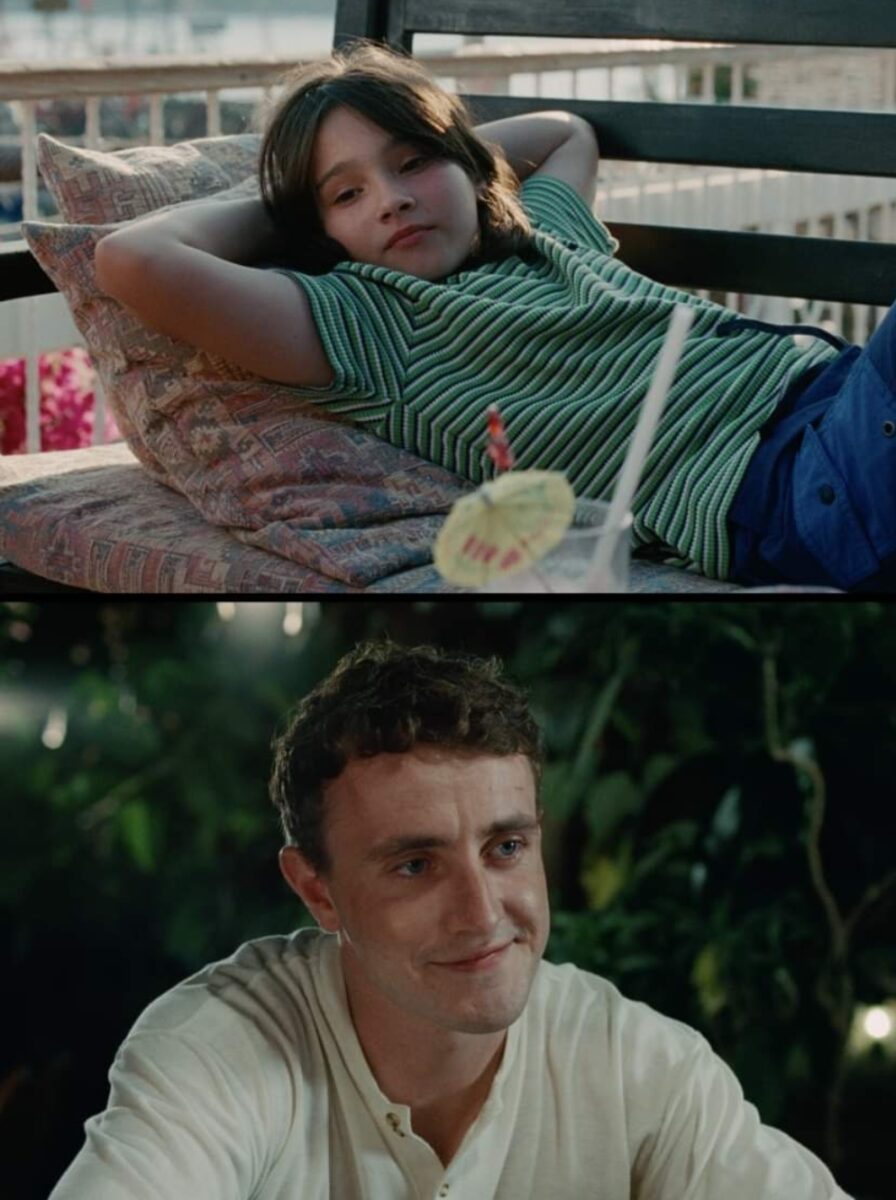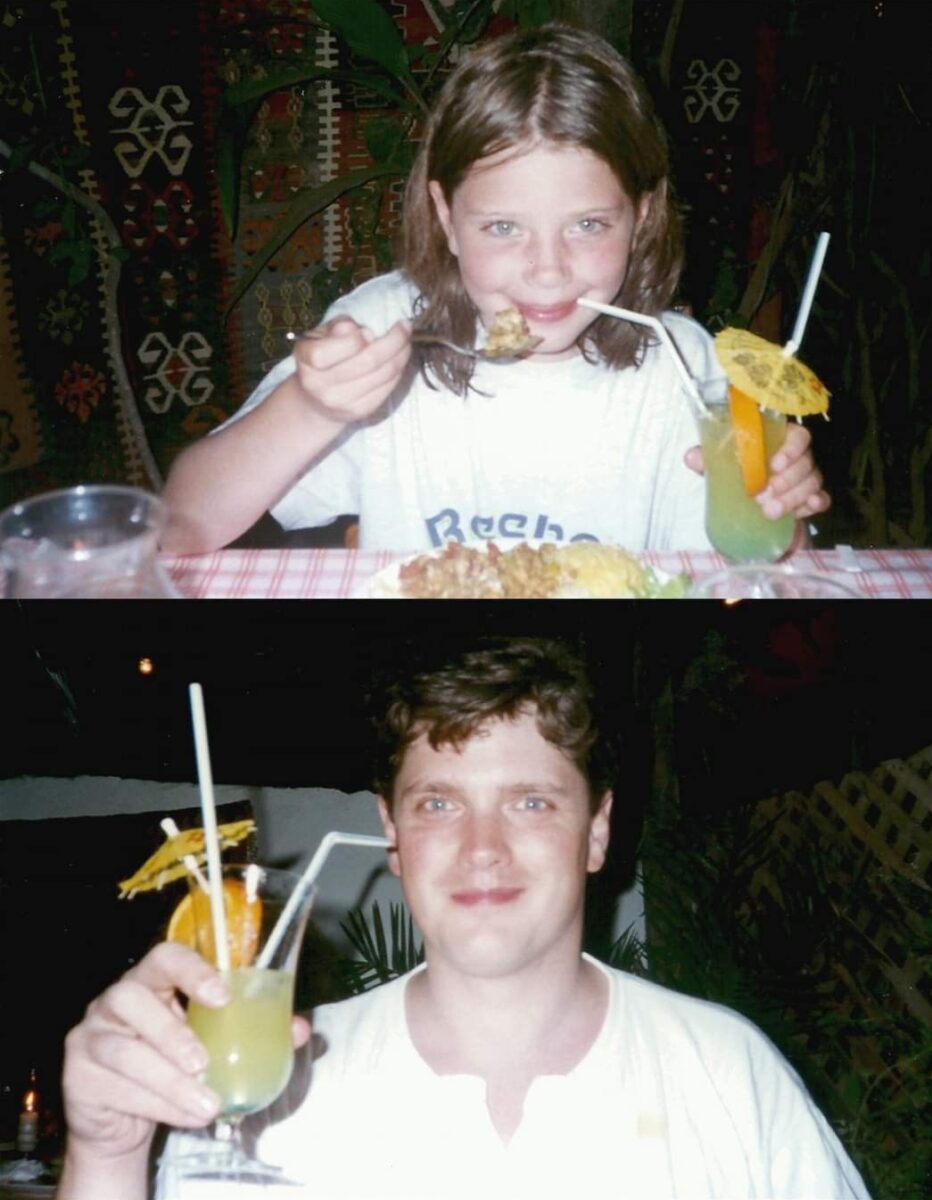Aftersun is writer and director Charlotte Wells’ (2022) understated debut film, but already her distinctive voice and vision dance with poise. The plot is minimal, the action deceptively low-key, but it moves with seductive and steady slowness to its resonant climax. The clothes, a Handycam camcorder, and a pitch-perfect soundtrack transport us back to sometime in the 1990s. Calum (Paul Mescal), a Scottish working-class father based in London, has brought his eleven-year-old daughter Sophie (Frankie Corio) on holiday to a cheapish Turkish resort in the hope of spending some quality with her before she returns to school and her life with her mother in Scotland.
Their days pass in the way one might expect: poolside games, amusement arcades, sea swimming, sunbathing, mud baths, and insipid evening entertainment where Los del Río’s Macarena is the musical flavour of the day. Though it appears nothing extraordinary takes place in their short time away, in the film’s many mini-moments between father and daughter everything happens.

A Sacred and Ghostly Past
In the opening scene we see as the adult Sophie (Celia Rowlson-Hall) playing, pausing and replaying camcorder footage of their trip on an old VHS tape as if trying to shed some light on a fading memory or forensically looking for clues to an unsolved puzzle. The powerful effect of making us feel we are gate-crashing a sacred and ghostly past is sustained and deepened throughout the film in the sense we have of something else getting replayed for Sophie.
Though the overarching narrative conceit of the film derives from the memory of the adult Sophie, a new parent herself, we see this is also a coming of age film about a young though sexually clued-up girl, cast among older teenagers in a foreign country, though we are left in no doubt about her overlapping curiosity about and adoration for her idealistic, loving but troubled father. The strong emotional undercurrent of the conversations between father and daughter has a mesmerising quality as they shift from mundane matters about school to the weightier topics of Sophie’s parents’ divorce, where she questions Calum about why he still tells her mother he loves her.
Though Calum can be fun, playfully coaxing her daughter to talk more about boys and at times appearing more of a friend than a father in encouraging her to speak to him with risky freedom, even about drug-taking (“I’ve done it all and you can too”), Calum’s protective and educative side also emerges in his attempts to teach her self-defence and guide her through meditative yoga. Wells’ unique craft keeps the dialogue to a minimum while capturing interactions that create intensity and sustain intrigue throughout.
In an uneasy long shot during which father and daughter, rub after-sun lotion on each other’s faces, suggesting not only a queasy intimacy but a possible further blurring of father-daughter boundaries, at other times Calum is so withdrawn and distant they appear worlds apart.
Absence and Presence
It is in his moments of solitude where Calum appears, in a Baudrillardian sense, absent in his own presence, and we see how he is mentally struggling. This is further amplified by some of his fatalistic, possibly prophetic self-commentary, such as how he is surprised he made it to thirty and doesn’t think he’ll reach forty.
There are further clues that his life hasn’t quite worked out the way he had hoped, echoed in Sophie’s many allusions to his failed financial ventures that leave him all at sea when it comes to explaining his relationship to the world of work. Though we are left in the dark as to why Calum’s arm is in a cast for part of the film, Marx’s idea of how capitalism can not only mortify the flesh but ruin the mind may resonate.

With a child’s intuitive empathy, Sophie compassionately picks up the unspoken stresses of Calum’s experience, as illustrated when, after she loses her scuba mask in the sea, her apology includes recognition that the equipment was expensive. On other occasions, however, Sophie calls her father out, urging him to stop trying to prove himself by promising her material things in a way that might make us feel she has been let down many times before and think about how he is over-compensating for what he cannot give her.
The other sex
We are immersed in a deeper understanding of the true nature of Calum’s melancholic spiral when he tries and fails to haggle down the price of a rug. In the next scene, we see we see him spaced out in the shop, his fingers tracing the intricate design in a way that suggests he could be stoned. His self-absorption is reinforced when he goes to a club and recklessly leaves Sophie to her own devices, during which she mingles with other kids in the resort and kisses a boy.
Calum’s love of clubbing is a nod to the UK rave scene of the early Nineties, whose dance culture was infamous for its circulation of recreational drugs while uniting partygoers from different strata and has been considered as a cultural reaction against the residue of the Thatcherite government that was so oppressive to the working class. In these ways, the conflict in Calum appears in his struggle to balance his own search for freedom with responsibility for his daughter.
One thing Calum does give Sophie, however, is a memory of his own of how, on his 11th birthday, he received nothing and indeed appeared to be mistreated by his mother, bringing home not only the material poverty that he experienced a child but also his lack of love. In light of this, Calum’s excessive desire to connect with his daughter seems to be driven by his desire to provide her with a more bountiful childhood to look back on.
In a heart-warming role reversal, Sophie gathers together a raggle-taggle group to sing Happy Birthday on his 31th birthday, which appears to embarrass him. Shortly after, we see him crying uncontrollably, pointing to the kernel of his inner turmoil, as though he is stricken by a confused sense of guilt arising from the conflict between his mother’s withheld affection and the overwhelming love that he is unable to properly show his daughter.
Filling in the Gaps
While the audience is left to fill in some of the gaps, the film’s iconic soundtrack supplies a degree of concrete lyricism, in which Catatonia’s Road Rage (“If all you’ve got to do today is find peace of mind / Come round you can take a piece of mine”) Blur’s Tender, and the penultimate finale of Queen and David Bowie’s Under Pressure sing volumes. In a late sequence when, after they share some ice cream, Calum starts to dance, he first embarrasses Sophie before they end by dancing together to a poignantly poetic counterpoint (‘And love dares you to change our way of caring about ourselves / This is our last dance /This is ourselves’).
In the film’s cryptic climax, Calum records Sophie as she boards a plane home to her life in Scotland with her mother. As they playfully say goodbye, we gather that this may be the last time Sophie sees her father. In the final scene, Calum stops the recording and walks away – though not back into the real world but into the strobe lights of Sophie’s memories that come from behind the door where he walks.
The implication appears to be that this becomes Sophie’s final active memory of her father and supplies a reason as to why she’s recalling these memories now. In this magical and melancholic scene, we might also interpret something being re-enacted by the adult Sophie dancing in the strobe throughout the film, as if she might be dancing in order to remember and keep the fading memories of him alive, who may or may not still be actually living. (In a scene where we see Calum striding forcefully towards the sea at night, there is a suggestion he may have committed suicide.)
For me, however, the film is at its most enigmatic in the recurring images of the strobe-lit adult Sophie intercut with her father dancing in a crowd at a rave. By the film’s end, the luminous mystique of these sequences take on their final charge as we retroactively piece together the characters’ fates.
The Director cuts
In her interviews, Wells, who herself took a holiday with her father at similar ages to Sophie and Calum in the film and has spoken about autobiographical elements in Aftersun, and the visceral emotions of this personal experience appear to shine through. However, it is through her use of ‘untimely’ cuts throughout the film that Wells demonstrates her directorial talent.

This technique also lures us into believing we have a glimmer of a narrative before it pulls us away into another trajectory. In cadence with the long shots, she interrupts the past (young Sophie) and present scenes (adult Sophie) in a reconstruction of the working of those memories in which lacunae emerge between what can be recollected and the fantasy that fills in what cannot.
At the same time, the editing effect might be thought to represent and evoke the real inaccessibility of ever knowing our parents’ desire as well as a cinematic representation of how we can only begin to approach the past when becoming an adult or a parent ourselves and looking back on its complexity.
Memory and Grief
Though Aftersun is a film about many things, a dominant theme throughout is that, if memory may be faulty at times, it can be crucial in periods of grief as a fantasied link to reach the people in our past. When we see the adult Sophie at home watching their holiday video while, sitting on the rug that looked like the one Calum was trying to buy in the shop in Turkey, we feel that she is taking some solace from looking back at her father’s attempts on holiday to not only love and to reach her but to make perpetual memories.
In such details, Wells’ debut not only oozes style but is awash with substance. By turns tender and tragic, Aftersun juxtaposes the hopeful resilience of adolescence and the at times hard and helpless world of adulthood, a world that can put people under such financial and economic pressure as to engender complex mental health issues, distorting and severing relationships. However, some hope emerges from the film in its depiction of the one thing the toxic capitalist system cannot commodify: our elusive memories.
Debuts such as these come around once in a generation. While Paul Mescal has deservedly earned an Oscar nomination for Best Actor and impressive newcomer Frankie Corio might also have received recognition, it is a shame Wells herself did not earn a nomination for Best Director. Wells does not spoon-feed sentimentality a la Spielberg, himself nominated this year for his own semi-autobiographical movie The Fabelmans (and no doubt supported by a lucrative promotional campaign), the independent resources that supported and trusted Wells style and artistic method have produced an original and rewarding film that subtly seduces her audience into diving deep into the pools of their own past.
Art Book Review Books Capitalism China Climate Emergency Conservative Government Conservative Party COVID-19 Creeping Fascism Economics EcoSocialism Elections Europe Event Video Far-Right Fascism Film Film Review France Gaza Global Police State History Imperialism Israel Italy Keir Starmer Labour Party London Long Read Marxism Marxist Theory Migrants NATO Palestine pandemic Protest Russia Solidarity Statement Trade Unionism Trans*Mission Ukraine United States of America War

